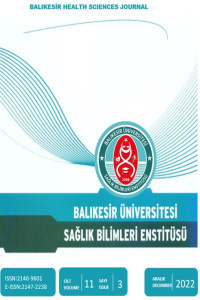Servis Sorumlu Hemşirelerine Verilen Eğitiminin Yeterlilik Algılarına Etkisi: Yarı-Deneysel Çalışma
Yönetici hemşireler, Eğitim, Organizasyon ve yönetim.
The Effects of the Training Program Organized For Unit Charge Nurses on Their Proficiency Perception: A Semi-Experimental Study
Nurse Administrators, Education, Organization and Administration,
___
- Arslan, A., Ağaçdiken Alkan, S., Özdelikara, A., & Mumcu Boğa, N. (2016). Samsun sağlık yüksekokulu öğrencilerinin beyin ölümü ve organ bağışına yönelik bilgi ve tutumlarına eğitimin etkisi. Samsun Sağlık Bilimleri Dergisi, 1(2), 1-17.
- Acarer EB, Beydağ KD. (2013).Yönetici hemşirelerin yaşadıkları sorunlar ve bunları etkileyen faktörler. Gümüşhane Üniversitesi Sağlık Bilimleri Dergisi, 2(1): 26-39.
- Armstrong SJ, Rispel LC, Penn-Kekana, L.(2015). The activities of hospital nursing unit managers and quality of patient care in South African hospitals: a paradox?. Global Health Action, 8(1):26243 https://doi.org/10.3402/gha. v8.26243
- Bekar EÖ, Baykal Ü. (2020). Evaluation of the nursing services controlling process from the viewpoint of the nurses and nurse managers: A Qualitative Study. Türkiye Klinikleri,12(1):83-92 https://doi.org/10.5336/nurses.20 19-66105
- Fennimore L, Warshawsky N. (2019). Graduate Leadership Education for Nurse Leaders—Needed Now More Than Ever. JONA, 49(7/8):347-349 https://doi.org/10.1097/ NNA.0000000000000765
- Fennimore L, Wolf G.(2011). Nurse manager leadership development: leveraging the evidence and system-level support. The Journal of Nursing Administration, 41(5): 204-210. https://doi.org/10.1097/NNA.0b013e3182171af f
- Koçel T. (2013). İşletme Yöneticiliği. (12th ed.). İstanbul: Beta Campany
- Karadaş A, Duran S, Özlem D.(2017). Servis sorumlu hemşirelerinin yönetsel yeterlik düzeylerinin belirlenmesi: Balıkesir ve Sakarya örnekleri. Mersin Üniversitesi Sağlık Bilimleri Dergisi, 10(1), 54-64.
- Lawson, C. (2020). Strengthening new nurse manager leadership skills through a transition-to-practice program. The Journal of Nursing Administration, 50(12), 618-622.
- Özen Bekar E. (2021). Hemşirelik Hizmetlerinde Yönetim ve Liderlik.In: Kaşıkçı M, Akın E, editors. Temel Hemşirelik Esaslar- Kavramlar, İlkeler, Uygulamalar. İstanbul: İstanbul Yayınevleri, 174-181.
- Patrician PA, Prapanjaroensin, A, Dawson M, White-Williams C, Miltner RS. (2018). Mapping and Sustaining Leadership Development: An Innovation Academic Service Partnership. JONA, 48(11), 567-573: https://doi.org/10.1097/NNA.0000000000000681
- Ramseur P, Fuchs MA, Edwards P, Humphreys J. (2018).The implementation of a structured nursing leadership development program for succession planning in a health system. J Nurs Adm. 48(1),25–30.
- Saifman H, Sherman, RO.(2019). The experience of being a millennial nurse manager. JONA, 49(7/8),366-371: https://doi.org/10.1097/NNA.000000000000076
- Sökmen S, Baykal Ü.(2007). İstanbul’daki kamu hastanelerinde görevli servis sorumlu hemşirelerinin yönetim eğitimi gereksinimlerinin analizi. Atatürk Üniversitesi Hemşirelik Yüksekokulu Dergisi, 10(4): 1-11.
- Sullivan J, Bretschneider J, & McCausland, M. P. (2003). Designing a leadership development program for nurse managers: an evidence-driven approach. JONA: The Journal of Nursing Administration, 33(10), 544-549.
- Swearingen, S. A (2009). Journey to leadership: designing a nursing leadership development program. The Journal of Continuing Education in Nursing, 40(3), 107-112. https://doi.org/10.3928/00220124-20090301-02
- Titzer JL, Shirey MR, Hauck S. (2014). A nurse manager succession planning model with associated empirical outcomes. J Nurs Adm, 44(1), 37–46.
- Warshawsky NE, Havens, DS.(2014). Nurse manager job satisfaction and intent to leave. Nurs Econ, 32(1): 32–39. https://www.ncbi.nlm.nih.gov/pmc/articles/PMC4330008 /
- Warshawsky NE, Caramanica L, Cramer E. (2020). Organizational Support for Nurse Manager Role Transition and Onboarding: Strategies for Success. JONA, 50(5), 254-260.
- Warshawsky N, Cramer E. (2019). Describing nurse manager role preparationand competency: findings from a national study. JNursAdm, 49(7), 249-255 https://doi.org/10.1097/ NNA.0000000000000746
- Westcott L. (2016). How coaching can play a key role in the development of nurse managers. Journal of Clinical Nursing, 25(17-18), 2669-2677 https://doi.org/10.1111/ jocn.13315
- Willcocks SG. (2012). Exploring leadership effectiveness: nurses as clinical leadersin the NHS. Leadership in Health Services, 25(1), 8–19. https://doi.org/10.1108/17511 871211198034Willcocks2012
- Wilson AA. (2005). Impact of management development on nurse retention. Nursing Administration Quarterly, 29(2), 137-145.
- Wong CA, Cummings GG. (2007). The relationship between nursing leadership and patients’ outcomes: A processic review. Journal of Nursing Management, 15(5), 508‒521. https://doi.org/10.1111/j.1365-2834.2007.00723.x
- ISSN: 2146-9601
- Yayın Aralığı: Yılda 3 Sayı
- Başlangıç: 2012
- Yayıncı: Balıkesir Üniversitesi
65 Yaş Üstü Kadınların Doğal Bitkisel Ürün Kullanma Durumları ve Etkileyen Faktörlerin Belirlenmesi
Şulenur YILDIZ, Elif KIRDI, Utku GÜRHAN, Fatih İNCİ, Semra TOPUZ, Nilgün BEK, Erman CEYHAN
Cerrahi Girişim Geçiren Hastaların Beslenme Durumlarının Ağrı ve Mobilizasyona Etkisinin İncelenmesi
Hemşirelik Mesleği Temalı Memes/Caps Kültürü: Bir Göstergebilim Çalışması
Ayşe Damla DÜŞÜNSEL, Gül Eda KILINÇ
Servis Sorumlu Hemşirelerine Verilen Eğitiminin Yeterlilik Algılarına Etkisi: Yarı-Deneysel Çalışma
Fatma Nur DUMAN, Zehra GÖLBAŞI, Ayten ŞENTÜRK ERENEL
Gebelikte Bitkisel Ürün Kullanım Durumlarının Belirlenmesi
Candan ERSANLI, Özlem AYDIN BERKTAŞ, Sadettin Oğuzhan TUTAR
Parkinson Hastalığında İkili Görevler: Önemi, Altta Yatan Mekanizmaları ve Tedavi Yaklaşımları
Aybüke Cansu KALKAN, Turhan KAHRAMAN, Arzu GENÇ
Dental Kaygı ve Ağız Hijyeni Farkındalığı Arasındaki İlişkinin Belirlenmesi
